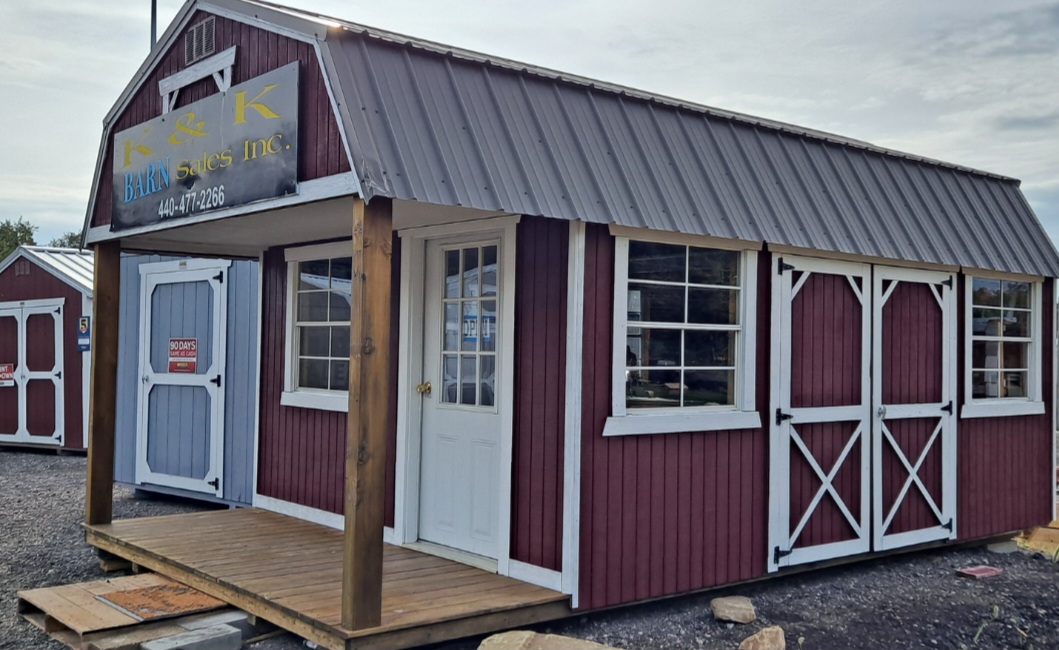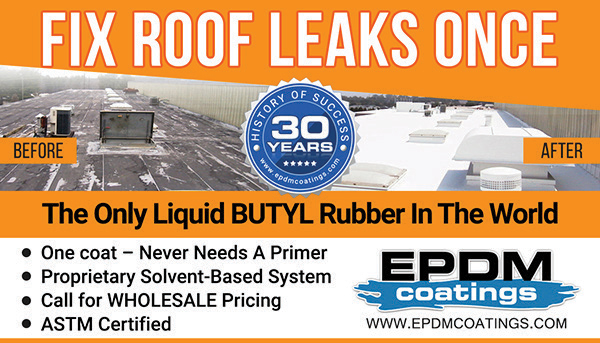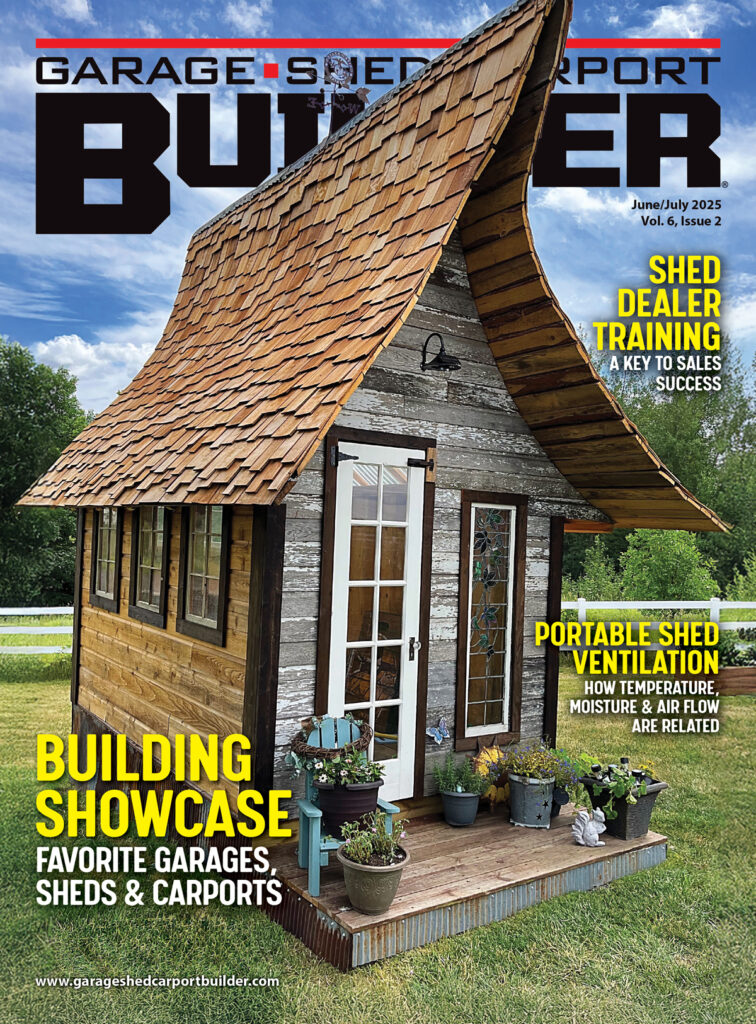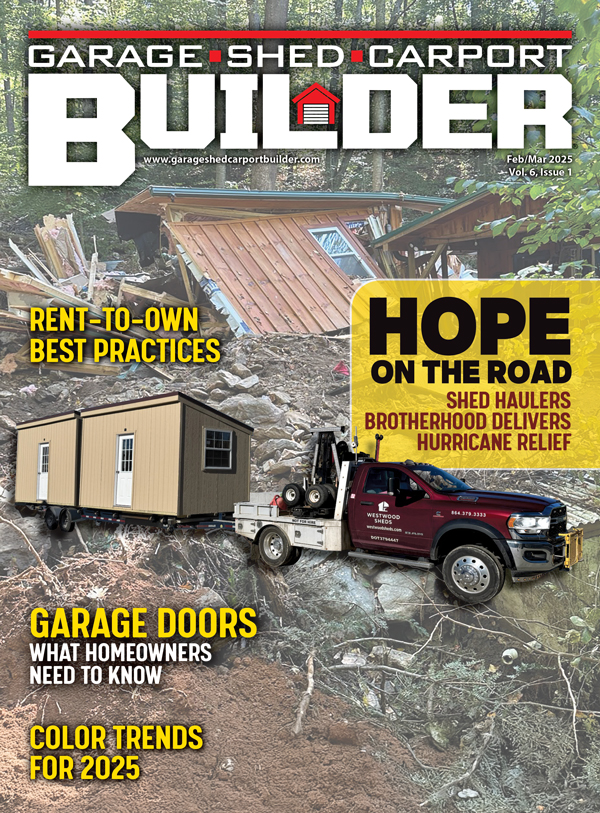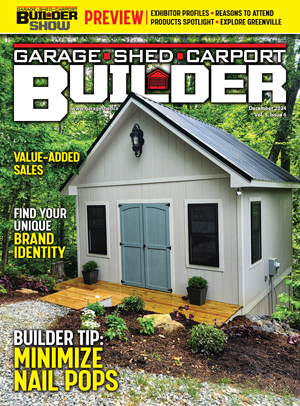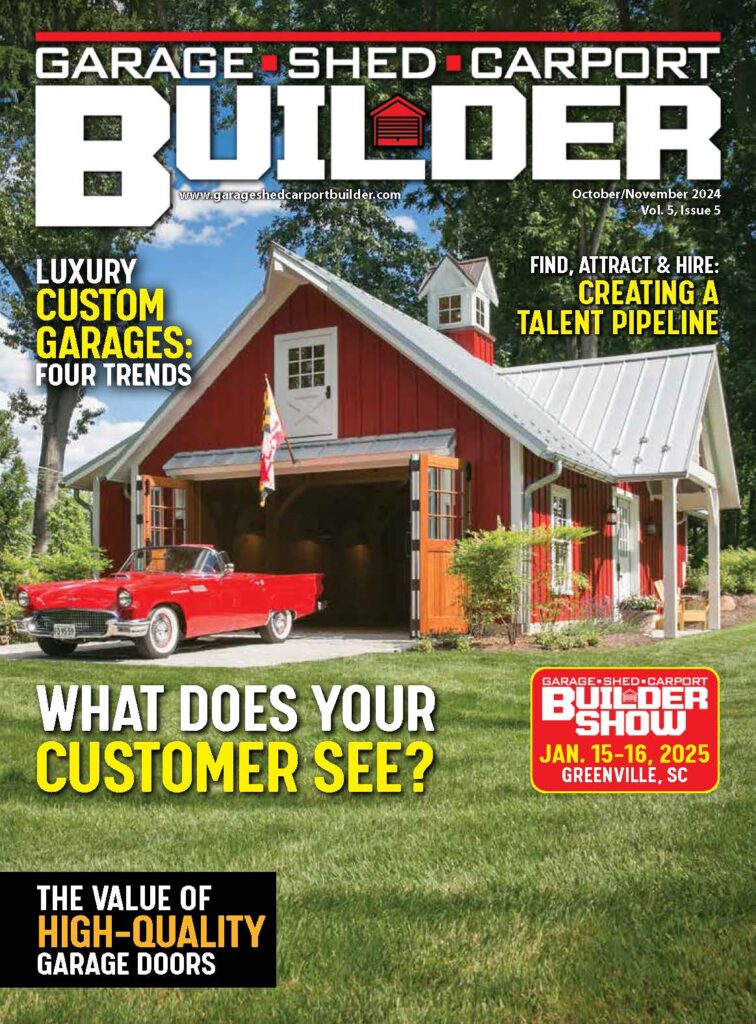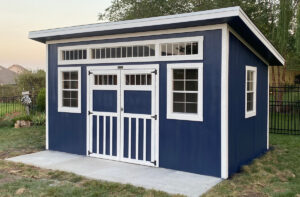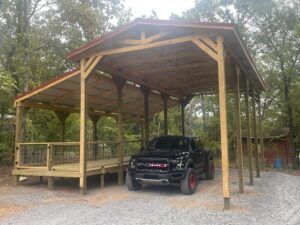By Randy Chaffee
When it comes to selling garages, sheds, and carports, the difference between a good salesperson and a great one often lies in their ability to ask the right questions. It’s not just about making a sale, but more about understanding the customer’s needs and ensuring they walk away with a product that truly meets those needs. To achieve this, sellers must delve deeper and engage with their customers to discover the real purpose behind their purchase. Here’s why asking those extra questions can make all the difference.
Understand the Purpose
Every customer who walks into a store or visits a website looking for a garage, shed, or carport has a unique purpose in mind. Some might need extra storage space, while others might want to protect their vehicles from the elements. Still others may be looking for a workspace or a hobby room. By asking specific questions about what the customer intends to do with their purchase, sellers can better understand these needs and recommend the most suitable options.
Storage Needs
For many buyers, the primary reason for buying a shed or garage is storage. But storage needs can vary greatly. Is the customer looking to store garden tools, seasonal decorations, or perhaps larger items like bicycles, lawn equipment, or even a weekend boat? Each of these uses might require different sizes, layouts, and even special features like shelving or reinforced floors. Asking about the specific items they plan to store can help guide them towards a structure with the right dimensions and accessories.
Vehicle Protection
When a customer is looking for a garage or carport to protect their vehicles, it’s essential to understand the type and number of vehicles involved. Are they protecting a single car, multiple vehicles, or perhaps even an RV? Do they need additional space for maintenance tasks or storage for tools and automotive supplies? By discussing these details, sellers can recommend structures with the appropriate dimensions, height, and even additional features like lighting or insulation.
Hobby Areas and Workspace
Garages and sheds aren’t just for storage. Many double as workshops, studios, or hobby areas. For customers planning to use their space in this way, sellers should inquire about their specific activities. Are they woodworking, crafting, or perhaps setting up a home gym? Different activities require different features, such as electrical outlets, ventilation, insulation, or reinforced floors. Understanding these needs helps in recommending a structure that’s not just a storage unit, but a functional space tailored to their customers specific hobbies and projects.
Build Trust Through Personalization
Asking detailed questions shows customers that you, the seller, are genuinely interested in helping them find the best solution. This approach builds trust. The customer feels their unique needs are being understood and addressed. When a seller takes the time to explore these specifics, it demonstrates a commitment to customer satisfaction rather than just making a quick sale.
Tailor Specific Buyer Recommendations
By understanding the customer’s specific needs, sellers can provide tailored recommendations that offer real value. For instance, a customer might initially look at a standard shed but, through conversation, reveals they need it for heavy-duty equipment. This information allows the seller to suggest a more robust structure with reinforced floors, saving the customer potential headaches and additional costs down the line.
Avoid Marketing the Wrong Sale
If we fail to ask the right questions, we as sellers risk offering products that don’t fully meet the customer’s needs. This can lead to dissatisfaction, returns, or negative reviews. By engaging in a thorough dialogue, sellers can avoid mismatched sales and ensure customers leave with a product that perfectly fits their requirements. This not only enhances customer satisfaction but also bolsters the seller’s reputation for quality and reliability.
Enhance the Buying Experience
A well-informed seller who takes the time to learn the needs of their buyer can transform the buying experience from a transactional interaction into a consultative journey. Customers appreciate being guided through their options with expertise and care. This positive experience can lead to repeat business and referrals, as customers are more likely to recommend a seller who provided exceptional service.
Educate the Customer
Part of asking the right questions involves educating customers about their options. For example, a customer might not know the benefits of a particular type of shed material or the advantages of different roofing styles. By discussing their specific needs and preferences, sellers can educate them on the best choices available, thus empowering them to make an informed decision. This leads to a raving fan versus simply a “customer.”
Address Concerns
Every customer has concerns. This can be about durability, maintenance, or cost. By engaging in a detailed conversation, sellers can address these concerns directly. If a customer is worried about the longevity of a wooden shed, for instance, the seller can explain the benefits of treated wood or suggest an alternative material like metal or vinyl. This proactive approach can alleviate doubts and reinforce the customer’s confidence in their purchase. By engaging the customer about their specific concerns, we demonstrate our desire as sellers to be more than simply transactional.

Build Long-Term Satisfaction and Loyalty
Asking the right questions not only leads to immediate sales but also fosters long-term customer satisfaction and loyalty. When customers feel their needs have been genuinely understood and met, they’re more likely to return for future purchases and recommend the seller to others. We really should get past the idea it’s a one sale and it’s over mentality. Let’s build the opportunity for future business from the customers family and friends.
Strengthen Relationships
By engaging with customers on a deeper level, we as sellers can build lasting relationships. These relationships are built on trust and satisfaction, encouraging customers to return whenever they need additional products or advice. Over time, these repeat customers can become advocates for the seller’s business, driving word-of-mouth referrals and enhancing the company’s reputation. This is such a force multiplier and needs to be at top of mind.
Futureproof Purchases
Customers’ needs can evolve over time. A customer who initially buys a small shed for gardening tools might later need a larger structure for expanded storage or a new hobby. By maintaining a relationship and understanding their evolving needs, sellers can offer timely upgrades or additional products, ensuring the customer’s needs are continually met.
Practical Steps for Sellers
To effectively ask the extra questions and provide the best recommendations, sellers should adopt a few practical strategies:
1. Train Your Sales Staff
Ensure all sales staff are trained to ask detailed questions about the customer’s intended use of the product. This includes understanding the various uses of your products and the specific features that cater to each.
2. Develop a Questionnaire
Create a standard set of questions that can guide the conversation. This might include questions about the type of items to be stored, the dimensions of vehicles, or specific hobbies and activities. Don’t make this scripted. This needs to come across as sincere. Develop the questions and have your sales team practice it until it’s a natural part of their customer interaction.
3. Listen Actively
Encourage staff to listen actively to the customer’s responses. By doing so, they will pick up on cues that might indicate additional needs or concerns.
4. Educate and Inform
Equip sales staff with the knowledge to educate customers about different materials, designs, and features. This helps customers make informed decisions based on their specific needs. Not only will this convey to the buyer your sales team’s expertise but also show a sincere desire to get the buyer into the structure best suited for their needs.
5. Follow Up After the Sale!
This is huge. Don’t simply believe the sale is over once the shed is delivered or the garage or carport is built. Follow up with customers to ensure they’re satisfied with their purchase. This not only shows that the seller cares about their satisfaction but also provides an opportunity to address any issues and build a long-term relationship. This can also lead to testimonials and recommendations.
Conclusion
Selling garages, sheds, and carports is about much more than just moving inventory. It’s about understanding the unique needs of each customer and providing a solution that truly meets those needs. By asking the right questions, sellers can build trust, enhance the buying experience, and foster long-term satisfaction and loyalty. In a competitive market, this approach not only sets sellers apart but also ensures that customers receive the best possible value from their purchase. Ultimately, it’s about helping customers obtain not just what they think they want, but what they truly need. GSCB
Randy Chaffee brings four-plus decades of experience to the post-frame and metal roofing industries. A board member for the Buckeye Frame Builders Association and the National Frame Builders Association, his podcast is available at facebook.com/BuildingWins. No web access? Call (814) 906-0001 at 1 p.m. Eastern on Mondays to listen.


